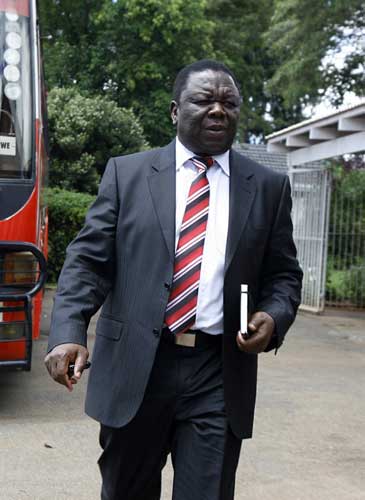Tsvangirai back in Zimbabwe for fresh talks

Your support helps us to tell the story
From reproductive rights to climate change to Big Tech, The Independent is on the ground when the story is developing. Whether it's investigating the financials of Elon Musk's pro-Trump PAC or producing our latest documentary, 'The A Word', which shines a light on the American women fighting for reproductive rights, we know how important it is to parse out the facts from the messaging.
At such a critical moment in US history, we need reporters on the ground. Your donation allows us to keep sending journalists to speak to both sides of the story.
The Independent is trusted by Americans across the entire political spectrum. And unlike many other quality news outlets, we choose not to lock Americans out of our reporting and analysis with paywalls. We believe quality journalism should be available to everyone, paid for by those who can afford it.
Your support makes all the difference.Morgan Tsvangirai, the Zimbabwe opposition leader, arrived back in the country yesterday, the first time he has returned since November last year. He said that he would not be "bulldozed" into joining a lopsided government of national unity.
Mr Tsvangirai, who has spent much of the time since then in neighbouring Botswana, arrived on a flight from South Africa. Tomorrow, Zimbabwe's political parties will hold meetings with the presidents of South Africa and Mozambique and with Thabo Mbeki, the Southern Africa Development Community- appointed mediator, in a new regional push to break a deadlock in power-sharing talks. Those talks will be followed by meetings between Zimbabwean negotiators on issues holding back the agreement on forming a unity government, South Africa's presidency said last week.
Despite the power-sharing agreement, President Robert Mugabe's party has grabbed nearly all the key ministries, appointed provincial leaders and reappointed the central bank governor blamed for the country's dizzying inflation, officially put at 231 million per cent.
There are growing concerns about the regional impact of Zimbabwe's meltdown. More than five million people are likely to be dependent on food aid because of a series of disastrous harvests. The collapse in water treatment facilities has fuelled a cholera epidemic that has so far killed more than 2,225. The Unicef executive director, Ann Veneman, met Mr Mugabe on Friday, as the UN urged Zimbabwe to speed up the delivery of humanitarian aid.
Zimbabwe's central bank will soon issue a 100 trillion Zimbabwe dollar banknote, worth about $33 on the black market, to try to ease desperate cash shortages. Prices are doubling every day and food and fuel are in short supply. As well as the Z$100 trillion dollar note, the Reserve Bank of Zimbabwe plans to launch Z$10 trillion, Z$20 trillion and Z$50 trillion notes, but previous banknote issues have done little to ease the plight of Zimbabweans who often queue for hours outside banks to withdraw barely enough to buy a loaf of bread.
Critics blame the economic meltdown on government mismanagement. The once-thriving farm sector has fallen into ruin.
Join our commenting forum
Join thought-provoking conversations, follow other Independent readers and see their replies
Comments